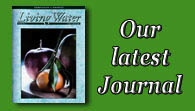“I felt I had to write and urge you to contend for the faith that was once for all entrusted to the saints” — Jude 3
“The pen is mightier than the sword” … at least so says the famous line written by an English author in 1839. But this is the twenty-first century — not the nineteenth, and times have radically changed. Today most people’s “writing” involves e-mails, instant messaging, text messages, twittering, and the like; lots of “touching base,” but little true writing. So in these days we might ask afresh, “Is the pen still mightier than the sword? Should the written word still be considered a powerful weapon for the Church in the modern culture in which we live?”
The answer is a resounding yes! There remains, in our day, an enduring power to the written word. It has a power we dare not underestimate or neglect. The written word is powerful … persistent … pervasive — a very important weapon for the Church to avail herself of if we are to advance the kingdom of God and defeat the plans of the enemy.
The Power of Perception
The power of the written word is considerable. Even today we tend to take what we read in newspapers, books, and magazines as being correct, true, and beyond suspicion. “It must be true; I read it in a book.” “I know that’s right; I saw it in the paper.” Because written words have been chosen, not just randomly spoken, we make the assumption that the writer has checked the facts, looked at the situation as a whole, done all their homework, and written a fair and balanced report. Our perception is that what is written has been more thought out, more carefully selected, and therefore we give it much more weight — more authority — than the spoken word.
Written words influence us more effectively because we perceive them to have more authority. We all can think of times when someone said something they didn’t mean to say. When someone uses the wrong word while speaking, we normally just realize their mistake and instantly replace the improper word with a more correct choice. But written words are not so easily discarded. Since we choose and approve the words we write, they are both more respected and less forgiven. If you say something negative about someone, it is fairly easy to explain it away as something wrongly spoken, misunderstood, or taken out of context. But if you were to write down the same slanderous statement, you could easily be found guilty of libel — those words didn’t just accidentally get on the paper!
The Power to Produce
Another reason the written word is so powerful is that it can easily be reproduced accurately. Unlike the spoken word, it is unchanging. How easily and quickly a spoken sentence changes when it is repeatedly shared (like in the game “Telephone”). With each new rendering, the phrase becomes more distant and distorted compared to what was originally spoken. But the written word is more powerful because it can so effortlessly be replicated — exact copies are simple to produce. Nearly anyone can get an article copied and give it away exactly as it was originally written.
While this might seem simple, it can produce a powerful multiplying effect for the written word. Years ago we received a letter from a man working in Saudi Arabia. He had been receiving our magazine, the Living Water Journal, for a few years, even though it was illegal in that country. He was writing to ask our approval for something he was doing. He oversaw a group of leaders whom each had oversight over a number of churches in different cities. Each of them helped to support a group of house church leaders who led individual house churches. What this man was doing was copying our magazine and giving it to the leaders under him, who would do the same and so on down the line. I started to realize that depending on how many cities and leaders we were taking about, his circulation of our magazine might have been larger than ours! That is the kind of powerful result possible because the written word can be easily reproduced.
The Power to Persist
There is something permanent and lasting about the written word. From the earliest clay tablets, papyrus sheets, stretched goatskin, to modern paper, the written word has always had a sense of permanent importance about it. The written word has a power of persistence that goes beyond its physical endurance, transcending logic and reason. After all, this article began with a quote that most of us know … and it was written 170 years ago!
Homer … Aesop … Shakespeare … Dickens … Thoreau … Twain … Tolstoy — with just one name we know about whom we are talking. Yet some of these men wrote more than 2,500 years ago! That is a testimony to the enduring power of the written word. Many of the books I enjoy reading were written by Christian authors who died many years ago. I’m thankful they took the time to write, so I could glean today from the things God had shown them years ago.
Many times the words we speak seem to vanish into thin air, gone as soon as they are spoken. But the written word is like a “chewy, chewy tootsie roll …”, it “lasts a long time.” William Shakespeare put it this way, “How long a time lies in one little word?” Because the written word has been written down, it has been preserved — like a dormant seed waiting for the right opportunity to sprout and produce life. Memories fade, things we hear are forgotten, but the written word continues to endure. If we will utilize the power of the written word, our words can live on … having an extended impact.
The Power to Pervade
The power of the written word is more than just persistent — it is pervasive. It not only endures; it permeates lives, penetrating where spoken words would be shut out. One of the reasons for this is that there is an implied acceptance when we choose to pick up something to read. In essence, we have given it the right to speak into our lives. Because of this, an article can often penetrate a resistant heart, for just the action of choosing to read it opens the door to the truth it contains.
The pervasive power of writing also comes from the fact that, since written words easily endure, they often make it to places we would never dream. The written word not only transcends the barrier of time; it breaks through geographic limitations as well. I remember receiving a wonderful testimony from someone who had been given a copy of our magazine in Mauritius and wanted to get a subscrip-tion. I still don’t know how they ever got their first copy, because we had never sent a single issue to Mauritius — and it is an island in the middle of the Indian Ocean! A few years ago we received another example of the pervasive power of the written word. After a church service, one of my friends informed me that they had found a number of my articles from our magazine on a Chinese website. I may not know how to effectively penetrate China with the truth that God has given me, but if I will just be faithful in writing, God knows how to make a way where there is none.
A Powerful Testimony
Allow me to share with you a final example of the enduring power of the written word. Our ministry received a letter from a pastor’s wife in rural Zimbabwe, Africa. Her husband, who was the associate pastor of a large church, was erroneously accused of wrongdoing by the senior pastor. He not only lost his job and home, they were “black-listed” by the church. This left them isolated and unable to find employment anywhere in the region. Her husband began traveling about desperately looking for work while she stayed behind trying to find some way to feed their children. After watching her children grow increasingly weaker from starvation, she decided to go into the largest city in the region and apply for aid. Everywhere she went, the doors were slammed in her face. And so, as she got on a bus to return, she decided she couldn’t stand to watch her children grow weaker, sickly, and die. She determined that upon arriving home she would kill her children and then take her own life.
But something miraculous happened on that bus ride home. She looked at the seat next to hers, and there, lying on that seat, was a copy of the Living Water Journal issue on “Hope.” As she read the magazine, she realized that God was not done with them yet; He was just refining their hopes. She repented of her plan and determined to hope and trust in the Lord anew. The Lord used that issue of our magazine to impart hope and save the lives of this woman and her children. How that magazine got on the bus only God knows, for up until that time we had never sent our magazine to Zimbabwe!
The Practical Application
Every article we write may not have such a powerful result, but any article could … but first it must be written. So how can you begin writing?
• Start “Journaling.” When the Lord gives you an insight while studying the Bible or at a prayer meeting, write down a few notes, and later write it out more completely. Remember the exhortation in Habakkuk 2:2, “Write down the revelation and make it plain on tablets so that a herald may run with it.”
• Write for your church’s newsletter. If your church doesn’t have one, ask your pastor if you can start one. This may seem small, but remember Zechariah 4:10 asks, “Who has despised the day of small beginnings?”
• Consider starting a blog. Blogs are fairly easy to set up, and you could write a weekly or monthly article with a little more substance to it than the normal blog entry.
• Consider submitting articles to some Christian magazines. Sure your articles could be ignored or rejected, but then again they could be accepted. Either way, just the practice of writing will sharpen your skills for the future.
• Pray and ask the Lord how He wants you to employ the power of the written word. But be warned, He might ask you to do things beyond yourself; things you can only do with His help.
What will the power of the written word produce through our lives? We cannot be certain, and we may never fully know, but we can be sure it will be fruitful. Writing is like planting seed in a garden. It will produce a harvest, but we never know exactly how much it will yield. It is kind of like the old adage: “You can count the number of seeds in an apple, but you can never count the number of apples in a seed.” God determines the fruitfulness, but we must plant the seed!
Every born-again believer has been given good seed from the Lord — biblical understanding we have gleaned, testimonies of God’s goodness and faithfulness, prophetic insights, and so much more. Therefore, each of us can have a lasting, pervasive, powerful impact on this world. Let us be faithful to plant the seed we have been given by being willing to write, and then leave the results in the hands of the Lord. The seed we plant by writing will not only be fruitful, the Lord will use it as a powerful weapon to advance His kingdom and push back the enemy. So, get out a pen, warm up the keyboard, and begin to plant your seed!
All contents of this website are protected under copyright. Living Water Ministry © 2020 All rights reserved.
www.livingwaterministry.net



